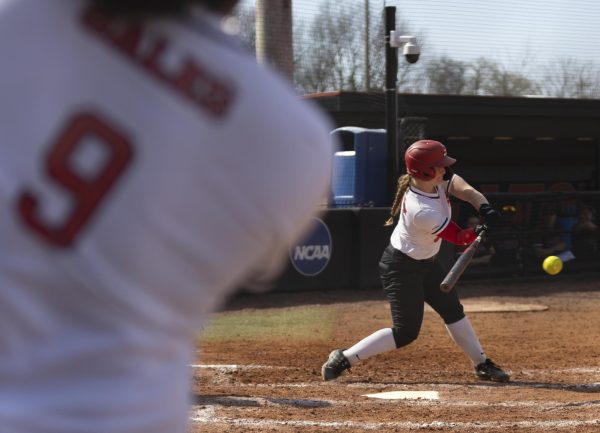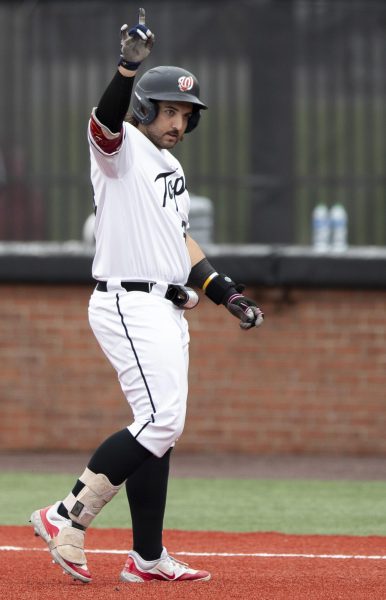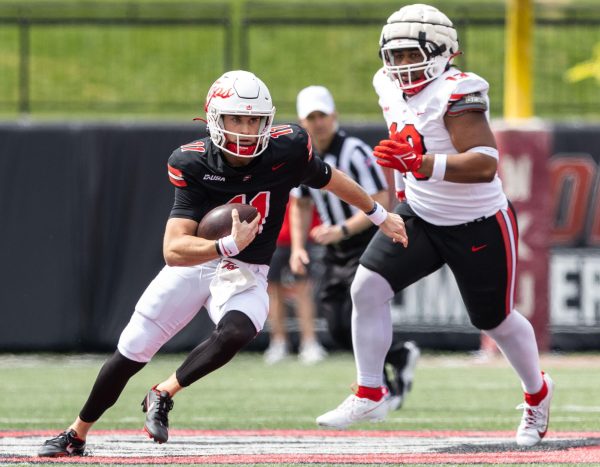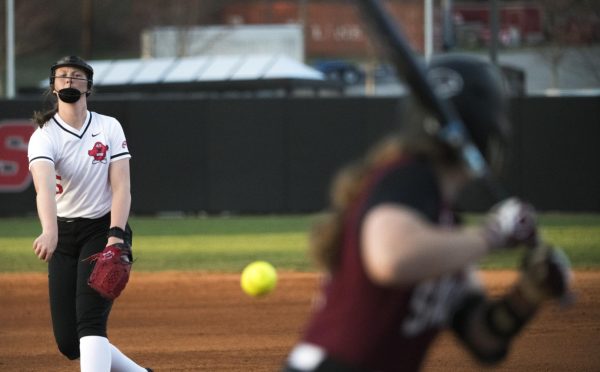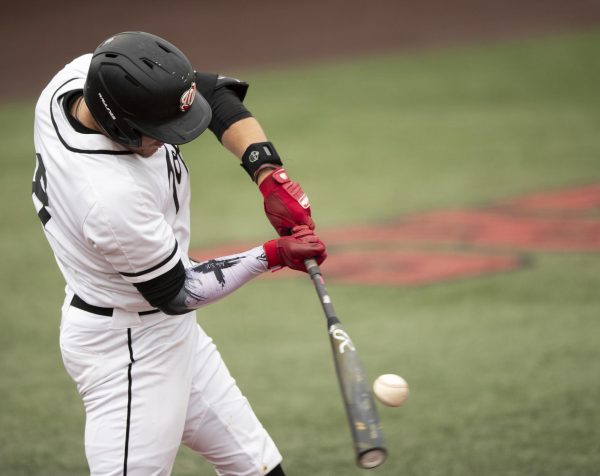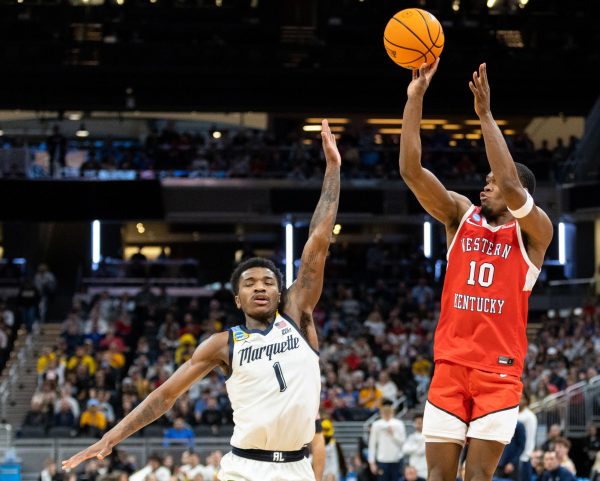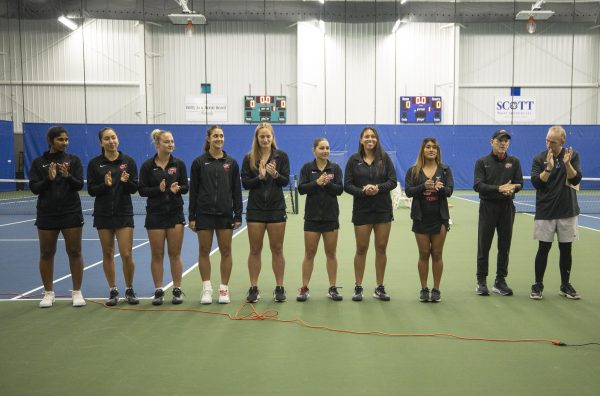Sticking with it
April 29, 2004
The football players rushed the field to celebrate their first national championship, gleefully pointing their index fingers in the air.
The story rocked Bowling Green in the fall of 2002, with fans showing their pride in the beloved Hilltoppers.
It was also the first season that junior outfielder Antone Towns spent away from football.
Towns was a two-sport phenomenon at Western for two seasons, as a quarterback for the football team and a hard-hitting outfielder in baseball.
But after playing two games in the 2002 football season, Towns decided to stop his football career and focus on baseball, his first love.
“It came down to what I liked more,” Towns said. “I liked both sports, don’t get me wrong, but at the time, I was thinking, ‘Here I am in football trying to get a role on the team and work on winning a starting position, and I already have a job on the baseball field.'”
Coming from an athletic background, it was inevitable that Towns’ athleticism would be noticed. His father, Tony, was a three-year letterman as a defensive lineman for Western from 1976-78. His mother, the former Angie Bradley, was an All-American in long jump in 1980 and was inducted in the Track and Field Hall of Fame in 1987.
His parents wanted him to be involved in physical activity, so Angie took him to the YMCA at age 5, and that’s when he began to play baseball.
“Before you knew it, I ended up liking it and did well in it and pursued it,” Towns said. “Then my dad asked me if I wanted to play football. Next thing you know, I picked up a football at age 10.”
That’s when he began to balance two sports at once.
The beginning of a super athlete
In eighth grade, Towns was leading the offense at Hikes Point, one of the best little league teams in Louisville. Towns’ throwing ability and strength was something unmatched by other kids his age, and that definitely got the high school coaches’ attention.
Towns saw that the coaches were interested in him playing on a high school level. But duPont Manual High School was the high school that stuck out the most, and that’s where he and a few of his Hikes Point friends decided to go.
“Manual was a good school in academics and we all agreed to go to that school to bring up the football program there that wasn’t well-known,” Towns said.
Freshman year was the only year that Towns did not see playing time on the team. His senior year, he helped lead the Crimson football team to a berth in the 2000 Kentucky state playoffs.
That following spring, he earned all-region honors as an outfielder on the baseball team.
Having the ability to excel in two sports wasn’t an easy burden for Towns.
Tennessee and Kentucky both made offers for him to play baseball only, and Louisville offered him a partial scholarship on the football team and said he could play as a walk-on for the baseball team.
But he wanted to play both.
Seeing Red
Only one school offered him a chance to play football and baseball – Western.
He came to the Hill with his parents on his official visit. His parents interacted with the people who coached them while they were students.
“I felt really comfortable being around some of the people that’s been around since they’ve been here,” Towns said. “Once I came to college I realized I had to work hard in order to play on the field.”
Towns knew that coming in as a freshman on the football team he was going to be redshirted to learn the team offense better.
While he sat out from the pigskin, Towns picked up on his aluminum game at the baseball diamond in the spring.
It was a tough adjustment to the baseball team because Towns didn’t spend much practice time with them.
“I’m playing football and I have a little less than a month to play the first baseball game,” Towns said. “Therefore, it’s harder to be in the rotation as far as playing on the baseball field.”
He seemed to have adjusted well, hitting .338 and collecting 52 hits in the 2001 season.
“Antone’s a very gifted athlete,” baseball coach Joel Murrie said. “In baseball, most scouts refer to the term “tools” – run, hit, throw, hit for power and fielding – and he definitely had tools for baseball.”
But Towns’ adjustment only looked easy.
Long winding road
Football was already a handful for Towns.
Every day he started started with a workout at 6 a.m. Then he went to class and ate lunch, and after lunch he watched film before practice.
After practice he went to dinner, which ranged from 6 p.m. to 8 p.m., and after dinner the players had a team meeting with coaches to go over practice film. Then they went to study hall for an hour before being in the dorm rooms by 11 p.m.
This became a huge problem when spring football season intermingled with baseball.
In the 2002 season, as a freshman on the baseball team, Towns had an 8 a.m. football scrimmage the same day he had a big conference game against Florida International.
“I’m playing the scrimmage for a couple of hours, and then I bounced back to play the FIU game,” Towns said. “I don’t know where the actual energy came from – just so happens that I did well in the game.”
That’s when he realized that his exhaustion with balancing two sports was too much on him. He had a 1.6 GPA, and having a below-average GPA was something new to him.
He needed his grades to maintain his eligibility in sports, so he worked hard the spring semester of his freshman year in order to bring his overall GPA to a 2.5 by the end of the year.
Towns wanted to continue to play football, though. Or at least, he thought he did.
After playing only two games in the 2002 season, Towns decided he wanted to stop playing football altogether.
Senior defensive end Kinnus Paul, a close friend of Towns, saw that Towns was struggling with the pressure involved with playing two sports.
“One sport takes way too much time, so I could only imagine playing two, especially at quarterback,” Paul said. “I was happy for him to choose baseball because it seemed like he had a chance to do something bigger with baseball.”
Football coach David Elson was the defensive coordinator at the time. He said that he was surprised about Towns’ decision to leave the team.
“Jason Michael was the quarterback, so (Towns) probably wanted to be in the sport where he’d be playing,” Elson said. “His role would’ve been backup and it turned out Jason was a good quarterback.”
Now that he’s a year removed from football, Towns has found himself in a hitting slump with a .208 batting average. It’s the first time in his baseball career he’s hit below .300.
“I’m in a slump, I won’t deny that at all,” Towns said. “It’s something that everybody goes through and it happens to be my time to go through a slump.”
Murrie hasn’t lost confidence in his player.
“Obviously I think he’s capable, because I keep putting him in the lineup,” Murrie said. “Most slumps as hitters are self-imposed. When things go great, you feel good, and when things go bad, you feel bad.”
Although he is struggling offensively, Towns still doesn’t regret his decision to hang up his football jersey and cleats.
If anything, he is cherishing the time he has on his hands in order to focus on what he loved first.
“Right now I’m going to try to finish up strong as far as academics go and end the season on a good note so I can have something to build off on the next year,” Towns said.
Reach Amber North at [email protected].


















